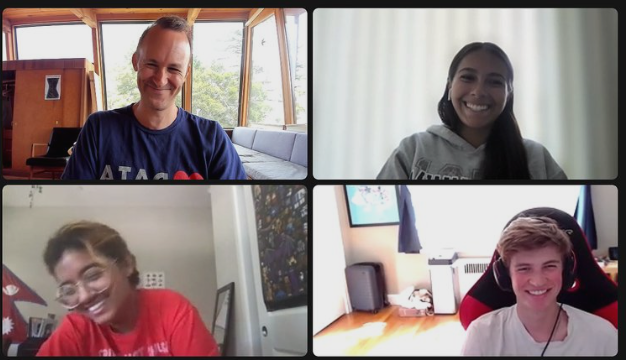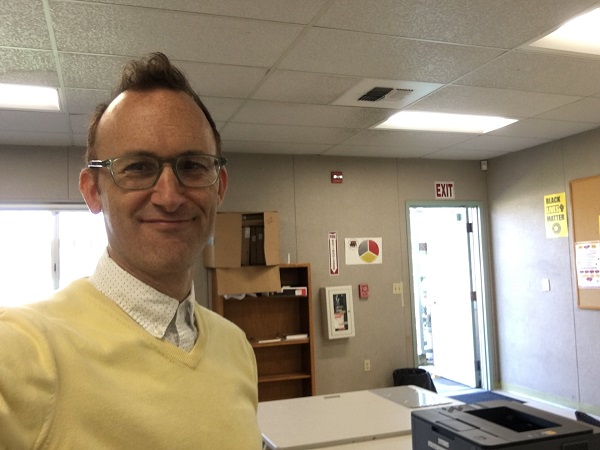
After graduating from Springboard, Corey Wade founded the Berkeley Coding Academy, which offers courses for teenagers in data science, AI, and machine learning. The programs are primarily hosted during the summer holidays so students can upskill in their free time. Corey also teaches 1:1 coding classes throughout the school year.
A former public school teacher, Corey spent about six months working as a data scientist for an education company called Path Stream, but he began to long for the classroom again. He also wanted to find a way to blend his teaching and data science.
“When you’re vying for a data science job, you’re competing against everyone else with that skillset,” he says. “But when you bring those skills to another industry, such as education, there are so many opportunities.”
That’s when he decided to start a coding academy. Corey believes data science skills are important, from the humanities to the sciences, no matter what discipline you’re in.
“Before Springboard, I was taking scattered classes online, and although I was learning a lot, it wasn't focused enough,” he says. “Springboard provides that focus for you.”
I started as a substitute teacher at Marcus Foster Elementary in West Oakland. I got to work with kids of all ages, which I enjoyed. But then the school closed down and I had to move on. Now I’m a math teacher in the Berkeley Unified School District.
Right. We teach data science and machine learning to teenagers. The idea behind the Berkeley Coding Academy is to give teenagers skillsets they can use in this changing world. It's a very small business. I started it right before COVID hit. We opened as a virtual program in the summer of 2020.

Teens are capable of learning anything. I enjoy interacting with teenagers. They keep me on my toes because they're not wrapped up in struggling to make ends meet like adults are.
I’m a teacher, so naturally, I wanted to teach others my new data science skills. School systems move slowly. Now I can say that I teach data science in the Berkeley Unified School District. I started a chess team as a senior in high school because my school didn’t have one. That experience gave me the confidence to start things. I was excited to create something on my own that anybody could sign up for from anywhere in the world.
AI has transformed not only the industry but academia, too. Machine learning is a necessity nowadays because traditional mathematical models are insufficient when we try to probe the far reaches of the universe and push the frontiers of knowledge. You need machine learning to deal with big data in physics, astronomy, and many other fields.
If I was a historian and wanted to analyze texts, the old method would be opening books and reading them to read every book. As a human being, I can only read so many books in so much time. We've shown that machine learning models can do this with sentiment analysis.
AI has transformed not only the industry but academia, too. Machine learning is a necessity nowadays because traditional mathematical models are insufficient when we try to probe the far reaches of the universe and push the frontiers of knowledge. You need machine learning to deal with big data in physics, astronomy, and many other fields.
If I was a historian and wanted to analyze texts, the old method would be opening books and reading them to read every book. As a human being, I can only read so many books in so much time. We've shown that machine learning models can do this with sentiment analysis.
I'm passionate about chess, and I think it's ideal for kids to learn because it trains the brain to think mathematically. I was teaching at Marcus Foster Elementary then and wanted to bring chess to more of these kids. I started an inner-city chess program and the kids loved it. We partnered with the Oakland Public Libraries and hosted tournaments there.

The cornerstone of what I teach now is the material I learned at Springboard. The career coaching component was also really valuable. I think it gave me the confidence to interact with people in business settings, put myself out there, and make connections.
Programming is empowering, period. A lot of people have ideas for apps, but you need to be able to program to build one. One of my students wanted to build an app to send people text cards based on mathematical occurrences. For example, “Happy billionth second!” That occurs when you hit the age of 31.9 years old. We taught ourselves how to code and make the app. Keep your options wide open; you never know what opportunities might come your way.
The mentorship. Springboard takes the time to pair each student with the most suitable mentor. My mentor, Kevin Glynn [solutions manager at Pyron] also had an educational background. We had a lot in common.
Once I had these skills, doors just opened. Springboard encouraged me to promote myself on LinkedIn. I became a published author from that.
Kevin is like a friend of mine. He's an exceptional machine-learning expert in his field. Having weekly meetings with someone I liked and could learn from was the essence of the program.
Another thing I loved about the Springboard program was the capstone projects. I built a machine-learning model to classify book reviews on Amazon as “helpful” or “not helpful.”
Springboard was absolutely worth it. Without Springboard, I would not have had the skills to start the Berkeley Coding Academy. It opened doors for me. I'm very glad that I chose Springboard because of the mentorship. I was able to study while working another job.
Springboard is a wonderful community to be a part of. The course has paid for itself ten times over in terms of the value I got from it. I highly recommend Springboard to anybody trying to jumpstart a new career.
Take advantage of the Springboard community. Don’t limit yourself to just looking for jobs. I'm an example of someone who took the skills I learned at Springboard and created my own business. Keep learning and pushing the envelope, and the right doors will open.





